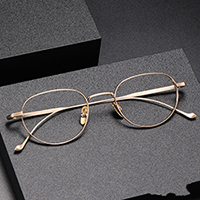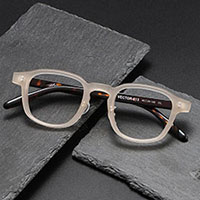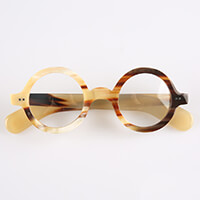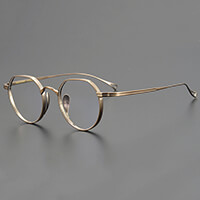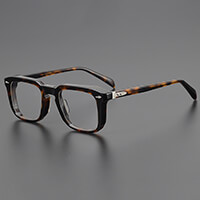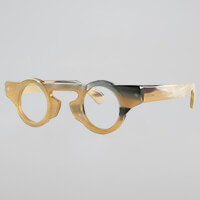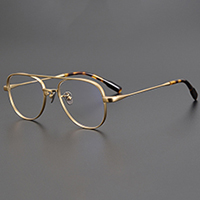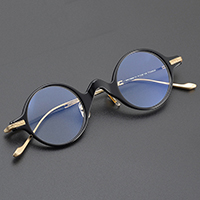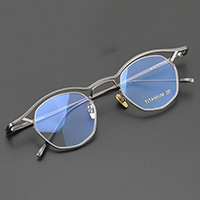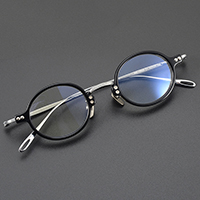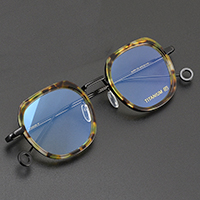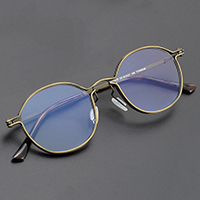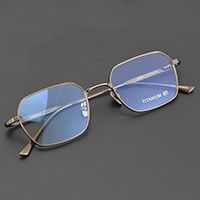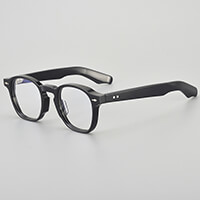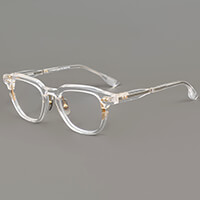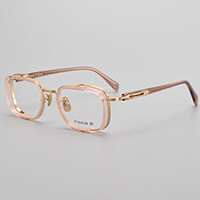Progressive Lenses Explained: A Modern Solution2024-05-25

After years of reading without glasses, Paul noticed the letters on his favorite novel were becoming blurry and difficult to discern.
This marked the onset of presbyopia, a common age-related issue where close-up vision deteriorates, causing inconvenience and frequent switching between different pairs of glasses. Progressive reading glasses can provide a seamless solution to this problem, allowing Paul to read comfortably again without the hassle of multiple glasses.
What Are Progressive Lenses?
Progressive lenses appear like any other prescription lens but feature the unique ability to house multiple prescriptions within each lens. They seamlessly integrate distinct vision zones into a single, continuous lens surface, allowing for a more comfortable and natural viewing experience.
This innovative design helps those with varying vision needs, such as presbyopia, to see clearly at all distances without switching between multiple pairs of glasses.
Definition and Features
Progressive lenses are multifocal lenses designed to provide clear vision at varying distances within a single lens. They seamlessly blend multiple prescriptions into one.These lenses are often referred to as "no-line bifocals" because they lack the visible lines found in traditional bifocals and trifocals, offering a smoother visual transition.
|
Progressive lenses reduce the need for multiple pairs of glasses, enhancing convenience and reducing clutter. |
Functionality Explained
Progressive lenses operate by incorporating multiple prescriptions into a single, unified lens, thus catering to various vision correction needs. This functionality suits individuals requiring clarity at multiple distances.The lens structure is divided into three primary zones.
These are specific to distance, intermediate, and near vision.
Blending these zones seamlessly enables wearers to shift focus smoothly.
This seamless design eliminates the abrupt "image jump" common with bifocal or trifocal lenses, reducing dizziness and improving user comfort.
Furthermore, the lack of visible lines on the lens surface contributes to a more youthful appearance, making progressive lenses both functional and aesthetically appealing.
Benefits of Progressive Lenses
Convenience: Progressive lenses offer the convenience of integrating multiple prescriptions into a single pair of glasses, eliminating the need to switch between different glasses for various tasks.
This seamless integration simplifies day-to-day activities, ensuring optimal vision whether you are reading a book, working on a computer, or driving. The continuous transition between vision zones allows for natural visual adjustments.
By eliminating visible lines, progressive lenses provide a more youthful and aesthetically pleasing appearance.
Enhanced Convenience
Progressive lenses combine multiple prescriptions into one lens, eliminating the need to switch between different glasses.- Streamlined routines: No more switching between reading and distance glasses.
- Youthful appearance: No visible lines, offering a seamless aesthetic.
- Intermediate vision: Perfect for computer use, reducing neck strain.
- Custom fit: Tailored to individual visual needs for optimal comfort.
These lenses are invaluable for maintaining productivity and comfort throughout your day.
Experience sharp vision for every distance without the hassle of carrying multiple pairs of glasses.
Seamless Vision
Progressive lenses excel in providing seamless vision. They ensure a fluid visual experience by blending different prescription strengths into one lens, which allows for natural and comfortable viewing adjustments without the interruption of visible lines. This seamless transition across various vision zones means tasks that require shifting focus between different distances can be performed effortlessly.The absence of visible lines not only contributes to aesthetic appeal but also aids in minimizing image distortion, commonly referred to as "image jump," that is often experienced with bifocals or trifocals. Progressive lenses allow the eyes to transition more smoothly from one vision zone to another, which enhances overall visual comfort and reduces the chances of experiencing dizziness or nausea during the adaptation period.
Additionally, users with progressive lenses report a significantly more harmonious visual experience throughout their daily activities. Whether you're transitioning from close-up tasks like reading a book, to intermediate activities such as working on a computer, or to distance vision requirements like driving, seamless vision ensures that there is no disruption in clarity or focus.
Moreover, this unbroken visual path contributes not just to comfort but also to maintaining better posture. With intermediate vision zones catering specifically to tasks like working on a computer, your head movements can remain more natural and less strenuous, reducing neck and eye strain. Thus, the seamless vision provided by progressive lenses is both a practical and health-benefiting advancement in corrective eyewear.
Challenges of Progressive Lenses
Despite their myriad benefits, progressive lenses can pose adaptation challenges for some wearers. The learning curve often involves retraining your brain to adjust to the varying focal lengths embedded within the lenses.During the initial adjustment period, users may experience symptoms such as dizziness, headaches, or even mild nausea as they acclimate to the different prescription zones required for varying distances. The lack of well-defined demarcation lines between these zones necessitates precise eye positioning, which can be challenging at first.
Careful and consistent usage can mitigate these issues, allowing users to make the most of the seamless vision they offer.
Adjustment Period
The adjustment period for progressive lenses can vary among individuals, generally lasting from a few days to a few weeks.1. Head Movements: Practice aiming your head, not just your eyes, to shift focus between different zones.
2. Focus: Look ahead when walking to avoid magnification issues from the near-vision zone.
3. Consistency: Wear your progressive lenses consistently to acclimatize more quickly.
4. Patience: Allow yourself time to adapt to the lens' various prescriptions.
5. Consultation: Regularly consult your eye doctor if you experience prolonged discomfort. Some users may initially experience dizziness or mild nausea as they adapt to the lens's multiple focal points.
Understanding and following these steps can facilitate a smoother and more comfortable transition to progressive lenses.
Cost Implications
The cost of progressive lenses varies significantly.Several factors influence their price, including the type of progressive lens, the lens material, and any additional coatings or treatments you may choose. Customizations, such as anti-reflective coatings or blue light filtering, add to the base cost. Additionally, branded or high-definition lenses from renowned manufacturers may command higher prices.
Progressive lenses are more expensive than single-vision.
However, the investment in progressive lenses is often justified by their convenience. One pair of progressive lenses can replace multiple pairs of single-vision glasses while providing an enhanced range of vision.
With ongoing technological advancements, prices for progressive lenses have become more accessible over time. Discount options and insurance reimbursements can also help to offset the initial cost, making them a viable option for a wider range of consumers.
Who Can Benefit from Progressives?
Anyone experiencing presbyopia, a common age-related vision change, stands to gain from progressive lenses. Typically, adults over 40 notice the gradual onset of presbyopia, necessitating multiple prescriptions within a single lens to maintain clear vision at all distances.Additionally, progressive lenses benefit individuals of any age who need varying levels of magnification. This includes those with occupational or recreational needs demanding different visual ranges. Whether you are working on detailed tasks, like crafting, or engaging in activities requiring sharp distance vision, progressive lenses provide the seamless solution you seek.
Ideal Candidates
People experiencing presbyopia, commonly adults over 40, benefit significantly from progressive lenses.- Professionals needing clear vision across various distances without switching glasses.
- Hobbyists engaged in activities requiring both near and distant focus, such as crafting.
- Children with specific eye muscle or focusing disorders that demand multifocal solutions.
- People with busy lifestyles who find it cumbersome to manage multiple pairs of glasses.
Progressive lenses are ideal for anyone who requires multiple prescriptions within a single lens.
Suitable for those seeking a more youthful appearance, as these lenses lack prominent visible lines.
They cater to individuals desiring enhanced convenience and versatility in their eyewear.
Tips for Wearing Progressive Lenses
Practice Head Movements: Aim your head, not just your eyes, in the direction you want to look.Look Ahead: Focus straight ahead rather than at your feet to prevent magnification issues.
Wear Them Often: Gradually increase the time you wear your progressive lenses to get used to them. This can minimize symptoms like dizziness, nausea, and difficulty focusing between zones.
Consult Your Eye Doctor: Follow your eye doctor's advice and let them know if you're having trouble adjusting. It's essential to communicate any persistent issues, as they may need to adjust your prescription or recommend additional strategies for adaptation. By following these tips, you can significantly enhance your visual comfort and overall experience with progressive lenses.
Shopping for Fashionable Glasses Online
Navigating eyewear options can be overwhelming.
However, shopping progressive glasses online makes the entire process much simpler. Our online store offers an extensive collection of fashionable glasses, tailored to suit every individual's unique style. With filters for various frame shapes, colors, and materials, you can find the perfect pair that complements both your vision needs and personal aesthetic effortlessly.
Discover trendy frames instantly.
From classic styles to the latest fashion-forward trends - no need to settle for less. Our curated selection includes handpicked designs from renowned brands, ensuring top-notch craftsmanship and high-quality materials.
Additionally, our website provides detailed size guidelines, virtual try-ons, and customer reviews to aid your decision. We also feature the latest eyewear trends for 2024, ensuring you stay stylish and up-to-date. Explore our site to find glasses that perfectly balance functionality and fashion.
- About Olet Optical
- Affordable Glasses Online for Every Budget
- Contact Us
- Customer Reviews
- Returns & Replacements
- Shipping & Payment
- Terms of Use
- Privacy Policy
- Infringement Policy
- Site Map
- Olet Blog
- User Center
- Register
- My Account
- Forget Password
- My Orders
- Tracking Order
- Refer a Friend
- Customs & Taxes
- Influencer Program
- How to Measure Pupillary Distance
- How to Measure Glasses Size


Copyright © 2025 Olet Optical. All Rights Reserved











